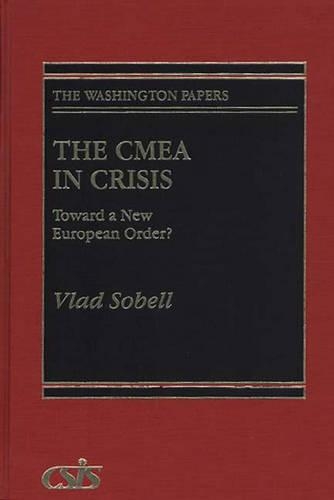
The CMEA in Crisis: Toward a New European Order
(Hardback)
Publishing Details
The CMEA in Crisis: Toward a New European Order
By (Author) Vlad Sobell
Bloomsbury Publishing PLC
Praeger Publishers Inc
26th July 1990
United States
Classifications
Tertiary Education
Non Fiction
International economics
337.147
Physical Properties
Hardback
122
Width 156mm, Height 235mm
397g
Description
This book identifies the essential features of the Soviet bloc's economic nexus: the Council for Mutual Economic Assistance (CMEA), and Gorbachev's reforms. It describes the impact of reforms on the CMEA and speculates on this organization's future. The author links the recent developments within the CMEA with the wide ranging, fundamental changes in the politics and economics of the Soviet bloc. It also examines the connection between the recent upheaval of the Eastern Alliance to the general flux on the entire European continent in anticipation of the post-1992 abolition of internal trade barriers in the European Community. Sobell argues that the predictions of the CMEA's disintegration must be seen in the context of the planned acceleration of West European unification in the 1990s. The EC is poised to become the core of the post Cold-War Europe and will act as a magnet on other European countries, including CMEA members. The CMEA in the age of perestroika, Sobell contends, will continue to maintain its communist facade, but will be a profoundly different organization with increasingly dynamic links with Western Europe.
Reviews
"For many years I've been reading Vlad Sobell's superb, if frequently much too brief, analyses on the Soviet and East European economies in the weekly Report on Eastern Europe, published by Radio Free Europe. In this eagerly awaited and up-to-date, longer study, Dr. Sobell shatters the illusion that the CMEA is or ever was the East European equivalent' of the West European Common Market. Indeed, the CMEA--essentially dormant over the years--is now on its deathbed, and this study offers a well-informed, balanced assessment of future prospects for the East European economies in the 1990s."-Charles Gati Professor of Political Science Union College
"Vlad Sobell's excellent study provides a much-needed framework for analyzing where East European economies have come from and where they are going. He imposes order on a dizzying set of developments."-Madeleine K. Albrignt President Center for National Policy
"Vlad Sobell's study on the CMEA reminds me of the tale of two drowning men who are pulling each other down. Each understands that it is (economic) suicide, but each has difficulty separating himself from the other. Sobell explains why this is so and examines implications for the West in this interesting analysis."-Marshall I. Goldman Professor of Economics Wellesley College
This short but timely book juxtaposes the Council for Mutual Economic Assistance and the perestroika reforms, analyzes the effect of the latter upon the former, and speculates on the future of both. The author, well qualified for his task, interprets the implicit Soviet subsidization of Eastern Europe as a dubious blessing, since it preserves the industrial distortions and inefficiencies of the member economies. Efforts to revive CMEA integration are ironically likely to bring about a de facto disintegration of the grouping, since genuine reforms are bound to expose its flawed economic rationale as a trade-destroying organization. Increasingly dynamic links are foreseen between CMEA members and the EC, especially after the switch to hard-currency accounting for CMEA and the post-1992 abolition of internal trade barriers in the EC. Compare with Andras Koves, The CMEA Countries in the World Economy (Budapest, 1985). Upper-division and graduate collections.-Choice
"This short but timely book juxtaposes the Council for Mutual Economic Assistance and the perestroika reforms, analyzes the effect of the latter upon the former, and speculates on the future of both. The author, well qualified for his task, interprets the implicit Soviet subsidization of Eastern Europe as a dubious blessing, since it preserves the industrial distortions and inefficiencies of the member economies. Efforts to revive CMEA integration are ironically likely to bring about a de facto disintegration of the grouping, since genuine reforms are bound to expose its flawed economic rationale as a trade-destroying organization. Increasingly dynamic links are foreseen between CMEA members and the EC, especially after the switch to hard-currency accounting for CMEA and the post-1992 abolition of internal trade barriers in the EC. Compare with Andras Koves, The CMEA Countries in the World Economy (Budapest, 1985). Upper-division and graduate collections."-Choice
Author Bio
VLAD SOBELL is the Senior Economic Analyst with Radio Free Europe (RFE) Research in Munich. He produces numerous RFE research bulletins and has contributed articles to the Washington Quarterly and East European Politics and Societies.
